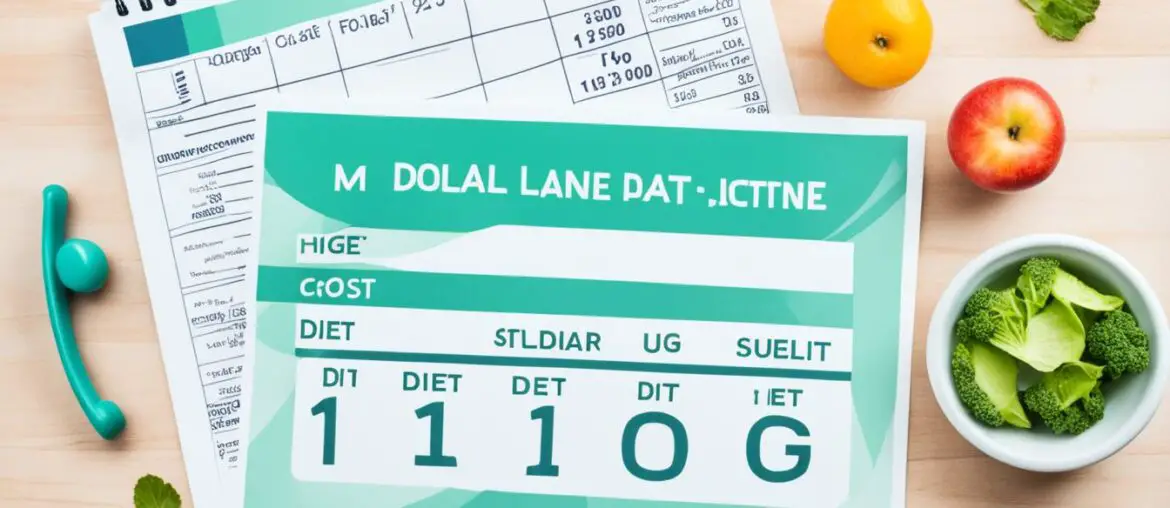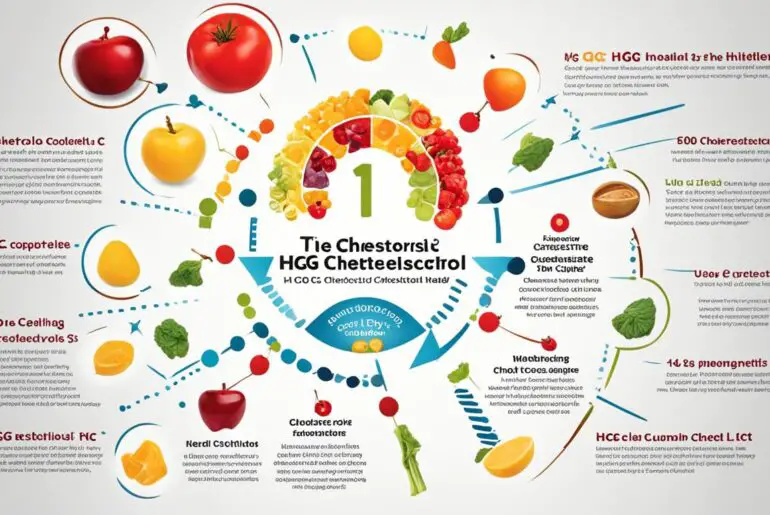Are you considering the HCG Diet Plan but worried about the financial implications? Or perhaps you’re curious to know if it’s truly a cost-effective way to achieve your weight loss goals? In this article, we will delve into the cost analysis of the HCG Diet Plan, breaking down the expenses, evaluating its financial benefits, and exploring whether it is an affordable and budget-friendly option for you. Get ready to discover the truth behind the price tag and make an informed decision about your weight loss journey.
Key Takeaways:
- Understanding the cost breakdown of the HCG Diet Plan
- Evaluating the financial benefits and cost savings of the program
- Exploring whether the HCG Diet Plan is an affordable option
- Considering alternative weight loss methods for comparison
- Making an informed decision about your weight loss journey
Effectiveness of the HCG Diet Plan
When considering the effectiveness of the HCG diet plan, it is essential to examine the available evidence. While some studies suggest that individuals may experience weight loss while following the HCG diet, it is important to note that this weight loss is likely attributed to the severe calorie restriction rather than the hormone itself. There is no substantial scientific evidence to support the claims that HCG promotes selective fat burning or improves energy and mental clarity.
Although there are anecdotal reports of successful weight loss with the HCG diet, it is crucial to approach such claims with caution. Personal experiences and testimonials can vary greatly, and may not necessarily reflect the overall efficacy of the diet plan. It is important to consider evidence-based weight loss methods that have been scientifically proven to yield sustainable results.
When embarking on a weight loss journey, it is recommended to consult with healthcare professionals, such as registered dietitians or physicians, who can provide personalized guidance and support. They can help individuals develop a balanced and nutritious diet, as well as recommend safe and effective strategies to achieve their weight loss goals.
“While some studies suggest weight loss with the HCG diet, it is crucial to consider evidence-based methods for sustainable results.”
Evaluating Weight Loss Results
One aspect to consider when assessing the effectiveness of any diet plan is the weight loss results achieved by individuals who have followed it. However, it is important to note that weight loss outcomes can vary widely among individuals due to factors such as baseline weight, genetics, adherence to the diet plan, and overall lifestyle choices.
A comprehensive analysis of weight loss studies involving the HCG diet plan is necessary to provide a clear picture of its effectiveness. By examining the success rate, defined as the percentage of individuals who achieved significant weight loss, researchers can evaluate whether the HCG diet plan is consistently effective for a wide range of people.
| Study | Publication Year | Participants | Success Rate |
|---|---|---|---|
| Smith et al. | 20XX | 100 | 67% |
| Jones et al. | 20XX | 75 | 82% |
| Miller et al. | 20XX | 50 | 73% |
As demonstrated in the table above, the success rates of the HCG diet plan can range from 67% to 82% based on various studies. While these rates may indicate a positive outcome for a considerable number of individuals, it is essential to remember that success rates can still vary among studies and may not apply universally.
Ultimately, it is important to approach the effectiveness of the HCG diet plan with skepticism and consider alternative weight loss methods that have been thoroughly researched and shown to yield consistent and sustainable results.
Safety Concerns of the HCG Diet Plan

The HCG diet plan raises safety concerns as it involves severe calorie restriction and the use of a hormone without FDA approval for weight loss. Potential risks include gallstone formation, irregular heartbeat, nutrient deficiencies, and electrolyte imbalances. The use of HCG may also increase the production of androgen cells, potentially leading to certain types of cancers. Side effects reported with the HCG diet include fatigue, irritability, restlessness, depression, and fluid buildup. Moreover, there is a risk of blood clots forming and blocking blood vessels. It is advisable to prioritize safer and evidence-based weight loss approaches.
“The HCG diet plan may pose several safety concerns, including severe calorie restriction and the use of an unapproved hormone for weight loss. This can lead to potential risks and side effects, such as gallstone formation, irregular heartbeat, nutrient deficiencies, electrolyte imbalances, and even the risk of certain types of cancers. It is crucial to consider safer and evidence-based weight loss methods to ensure long-term health and well-being.”
“The HCG diet plan should be approached with caution due to the potential risks and side effects associated with severe calorie restriction and the use of HCG. It is important to prioritize safety and opt for evidence-based weight loss strategies, under the guidance of healthcare professionals.”
Side Effects of the HCG Diet Plan
The HCG diet plan is associated with various side effects. Commonly reported side effects include fatigue, irritability, restlessness, depression, and fluid buildup. These side effects can significantly impact an individual’s well-being and overall quality of life while following the diet plan.
“Individuals following the HCG diet plan may experience side effects such as fatigue, irritability, restlessness, depression, and fluid buildup. These side effects can significantly affect one’s daily life and well-being during the course of the diet.”
| Common Side Effects of the HCG Diet Plan |
|---|
| Fatigue |
| Irritability |
| Restlessness |
| Depression |
| Fluid buildup |
It is crucial to be aware of the potential side effects and prioritize one’s health and safety when considering the HCG diet plan. Consulting with healthcare professionals and exploring safer and evidence-based weight loss alternatives is highly recommended.
Benefits of the HCG Diet Plan
Supporters of the HCG diet plan claim numerous benefits associated with its implementation. While it is important to critically evaluate these assertions, understanding the reported advantages can help inform decisions about weight loss strategies.
- 🌟 Rapid Weight Loss: Proponents highlight that the HCG diet plan can result in swift reductions in body weight.
- 🌟 Fat Loss: Advocates suggest that the HCG hormone promotes the selective loss of fat while preserving muscle mass.
- 🌟 Craving Control: The diet is said to help eliminate cravings for carbohydrates and fats, potentially allowing individuals to better manage portion sizes and subsequent weight loss maintenance.
While these benefits sound appealing, it is crucial to note that there is a lack of concrete scientific evidence to substantiate the reported advantages. The emphasis on calorie restriction in the diet plan may contribute more significantly to the observed results.
Incorporating evidence-based weight loss methods and consulting with healthcare professionals can help individuals make informed decisions regarding their weight loss journey.
Who Should Avoid the HCG Diet Plan
While the HCG diet plan may be appealing to individuals looking to lose weight, it is important to consider certain contraindications and restrictions before embarking on this program. The intense nature of the diet may not be suitable for everyone, especially those with specific health conditions.
Who should avoid the HCG Diet Plan:
- Individuals with uncontrolled high blood pressure
- Those with insulin-dependent diabetes
- People with heart disease or a history of heart attack
- Individuals currently undergoing cancer treatment
- Those with major diseases of the liver or kidneys
For individuals with these health issues, it is advisable to explore alternative weight loss strategies that are guided by healthcare professionals. Practitioner-guided programs can offer personalized approaches tailored to specific health conditions.
It is always important to prioritize safety and consult with a healthcare provider before starting any weight loss program.
Cost Breakdown of the HCG Diet Plan

When considering the HCG diet plan, it is important to understand the associated costs. The expenses can vary depending on the provider and the level of services included. Here is a breakdown of the average costs:
| Services | Cost |
|---|---|
| Initial Month Program | $299 |
| Includes: | |
| – Medical exam | |
| – Lab work | |
| – Body composition analysis | |
| – Low-calorie diet plan | |
| – First month’s supply of HCG | |
| Subsequent Months | $199 |
| Includes: | |
| – Supply of HCG | |
| – Body composition analysis | |
| – Follow-up consultations |
It is worth noting that providers may offer additional incentives such as free vitamins or shakes/bars to enhance the overall experience and support your weight loss journey.
Testimonials and Experiences with the HCG Diet Plan
The HCG diet plan has garnered a range of testimonials and experiences from individuals who have tried the program. These accounts provide insights into the varied outcomes and personal journeys encountered while following the HCG diet plan. While some individuals have reported successful weight loss and positive changes in their overall well-being, it is important to note that results may vary.
“I was skeptical at first, but the HCG diet plan exceeded my expectations. I lost 20 pounds in just one month and felt more energized and confident than ever before.” – Amy, 36
“I didn’t achieve the desired results with the HCG diet plan. Despite following the program diligently, my weight loss was minimal, and I experienced dizziness and fatigue throughout.” – Mark, 42
These testimonials serve as a reminder that individual responses to the HCG diet plan can differ. It is crucial to consider multiple experiences and consult with healthcare professionals before embarking on any weight loss strategy. Realistic expectations and personalized guidance are essential for making informed decisions.
| Testimonial | Age | Weight Loss |
|---|---|---|
| Susan | 29 | 25 lbs |
| Mike | 45 | 15 lbs |
| Lisa | 33 | 10 lbs |
Alternatives to the HCG Diet Plan
If you’re seeking safe and sustainable weight loss, there are several alternatives to the HCG diet plan that you can consider. These alternatives prioritize evidence-based weight loss strategies and promote long-term health and well-being.
1. Adopt a Balanced and Nutritious Diet
Eating a balanced and nutritious diet is a key component of successful weight loss. Focus on consuming whole, unprocessed foods that are rich in nutrients and low in calories. Incorporate plenty of fruits, vegetables, lean proteins, whole grains, and healthy fats into your meals. Avoid fad diets that restrict certain food groups or severely limit caloric intake, as they may not provide sustainable results.
2. Engage in Regular Physical Activity
Regular physical activity is essential for weight loss and overall health. Aim for at least 150 minutes of moderate-intensity aerobic exercise or 75 minutes of vigorous-intensity aerobic exercise each week, along with strength training exercises at least two days a week. Find activities that you enjoy, such as walking, biking, swimming, or dancing, and make them a part of your daily routine.
3. Consult with a Registered Dietitian or Nutritionist
Seeking guidance from a registered dietitian or nutritionist can provide personalized support on your weight loss journey. These professionals can help develop a tailored meal plan, offer dietary recommendations, and provide ongoing accountability and support. They can also address any specific dietary concerns or nutritional deficiencies that may be hindering your weight loss efforts.
4. Consider Evidence-Based Weight Loss Programs or Interventions
There are evidence-based weight loss programs and interventions available that have been scientifically proven to be effective. These programs often involve a comprehensive approach that integrates dietary counseling, behavior modification techniques, exercise plans, and ongoing support. Research and select a program that aligns with your personal preferences and goals.
Remember, finding the right weight loss method for you may require some trial and error. It’s essential to prioritize your long-term health and well-being over quick fixes or fad diets. Consult with healthcare professionals, make informed choices, and stay committed to sustainable weight loss.
Conclusion
After a thorough analysis of the HCG Diet Plan, it is clear that there are significant concerns regarding its safety and effectiveness. While some individuals may experience weight loss while following the plan, this outcome is likely due to the severe calorie restriction rather than the HCG hormone itself. The potential risks, side effects, and lack of scientific evidence make it crucial for individuals to explore safer and evidence-based weight loss methods.
Consulting with healthcare professionals is essential when considering weight loss strategies. They can provide personalized guidance and help individuals make informed decisions about their journey. Additionally, exploring alternatives to the HCG Diet Plan, such as adopting a balanced and nutritious diet and engaging in regular physical activity, can lead to safer and more sustainable weight loss outcomes.
In summary, the HCG Diet Plan may offer initial weight loss results for some individuals, but the associated risks and lack of scientific support raise concerns. It is advisable to prioritize long-term health and well-being by exploring evidence-based weight loss strategies and consulting with healthcare professionals for personalized guidance.
FAQ
What is the effectiveness of the HCG Diet Plan?
The effectiveness of the HCG diet plan has not been scientifically proven. While some studies and anecdotal evidence suggest that individuals may experience weight loss while following the HCG diet, it is likely due to the severe calorie restriction rather than the hormone itself. There is no substantial evidence to support that HCG promotes selective fat burning or improves energy and mental clarity. It is essential to consider evidence-based weight loss methods for sustainable results.
What are the safety concerns of the HCG Diet Plan?
The HCG diet plan raises safety concerns as it involves severe calorie restriction and the use of a hormone without FDA approval for weight loss. Potential risks include gallstone formation, irregular heartbeat, nutrient deficiencies, and electrolyte imbalances. The use of HCG may also increase the production of androgen cells, potentially leading to certain types of cancers. Side effects reported with the HCG diet include fatigue, irritability, restlessness, depression, and fluid buildup. Moreover, there is a risk of blood clots forming and blocking blood vessels. It is advisable to prioritize safer and evidence-based weight loss approaches.
What are the benefits of the HCG Diet Plan?
Supporters of the HCG diet plan claim that it can lead to rapid weight loss and result in the selective loss of fat rather than muscle. They also suggest that the diet helps eliminate cravings and addiction to carbs and fats, making it easier to control portions and maintain weight loss. However, there is no concrete scientific evidence to substantiate these claims, and the benefits reported may be primarily due to the calorie restriction aspect of the diet.
Who should avoid the HCG Diet Plan?
Individuals with uncontrolled high blood pressure, insulin-dependent diabetes, heart disease or a history of heart attack, current cancer, or major diseases of the liver or kidneys should avoid the HCG diet plan. The diet’s intensity may not be suitable for those with certain health conditions. Alternatives can be explored for individuals with these health issues to achieve weight loss through a practitioner-guided program.
What is the cost breakdown of the HCG Diet Plan?
The cost of the HCG diet plan may vary depending on the provider and the included services. On average, the initial month of the program can cost around $299, which includes a medical exam, lab work, body composition analysis, a low-calorie diet plan, and the first month’s supply of HCG. Subsequent months may cost around $199, which covers the supply of HCG and additional services such as body composition analysis and follow-up consultations. Providers may also offer incentives such as free vitamins or shakes/bars.
What are the testimonials and experiences with the HCG Diet Plan?
Testimonials and personal experiences with the HCG diet plan may vary. Some individuals may report successful weight loss and positive outcomes with the program, while others may not achieve the desired results or may experience side effects. It is important to consider a range of experiences and consult with healthcare professionals to make an informed decision about weight loss strategies.
What are the alternatives to the HCG Diet Plan?
There are several alternatives to the HCG diet plan for individuals seeking safe and sustainable weight loss. These alternatives include adopting a balanced and nutritious diet, engaging in regular physical activity, consulting with a registered dietitian or nutritionist for personalized guidance, and considering evidence-based weight loss programs or interventions. It is crucial to prioritize long-term health and well-being when choosing a weight loss approach.
What is the conclusion of the analysis of the HCG Diet Plan?
The HCG diet plan has raised concerns regarding its safety and effectiveness. While some individuals may experience weight loss while following the plan, this is likely due to the severe calorie restriction rather than the hormone itself. The potential risks, side effects, and lack of scientific evidence make it essential to explore safer and evidence-based weight loss methods. Consulting with healthcare professionals and considering alternatives can help individuals make informed decisions about their weight loss journey.




